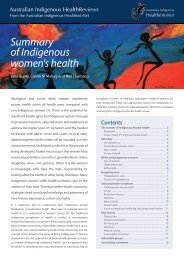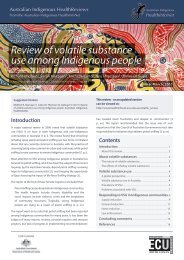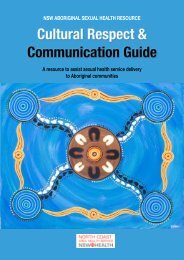hearing loss and the criminal justice system - Australian Indigenous ...
hearing loss and the criminal justice system - Australian Indigenous ...
hearing loss and the criminal justice system - Australian Indigenous ...
You also want an ePaper? Increase the reach of your titles
YUMPU automatically turns print PDFs into web optimized ePapers that Google loves.
Senate Inquiry March 2010_________________________________________________________________________________________________________________Cross‐cultural challenges <strong>and</strong> essential competencies for staff working in cross‐culturalcontextsNon‐<strong>Indigenous</strong> staffBecome proactive <strong>and</strong> seek feedback from<strong>Indigenous</strong> people about what <strong>the</strong>y think<strong>and</strong> how <strong>the</strong>y feel.Learn to recognise <strong>and</strong> underst<strong>and</strong> indirectmessages such as <strong>the</strong> use of humour tomake a point indirectly.Learn to become more aware of nonverbalmessages.Work closely with <strong>Indigenous</strong> people whocan provide advice on <strong>Indigenous</strong> styles ofcommunication.Realise that direct feedback may upset<strong>Indigenous</strong> people.Try to minimise negative feedback <strong>and</strong> becareful about how it is given.Avoid confrontation where someone mayfeel ‘shamed’.<strong>Indigenous</strong> staffBecome comfortable with less consultative<strong>and</strong> more directive ways of working withnon‐<strong>Indigenous</strong> staff.Learn not to look for indirect meaning in<strong>the</strong> behaviour of non‐<strong>Indigenous</strong> staff <strong>and</strong>to ignore, minimise <strong>the</strong> effect of, or filterout some of <strong>the</strong> direct critical feedbackfrom non‐<strong>Indigenous</strong> people.Learn to become less sensitive <strong>and</strong> lessresponsive to non‐verbal critical responsesof non‐<strong>Indigenous</strong> staff.Work closely with non‐<strong>Indigenous</strong> peoplewho can provide advice on non‐<strong>Indigenous</strong>styles of communication.Underst<strong>and</strong> <strong>and</strong> evaluate <strong>the</strong> variablenature of critical feedback; is it associatedwith administrative compliance issues, oris it a challenge to impress someone else,or is it a serious attack?Try to become more comfortable with <strong>the</strong>use of direct negative feedback.Become more comfortable withconfrontation when this is needed <strong>and</strong> <strong>the</strong>use of direct positive <strong>and</strong> negativefeedback.TRAINING AND MENTORING NEEDSIt is essential that <strong>the</strong> training of teachers, police <strong>and</strong> corrections staff include a componentabout <strong>the</strong> conceptual frameworks that can encourage respect for o<strong>the</strong>r cultures <strong>and</strong> <strong>the</strong>irculture based communications strategies. When cross‐cultural training is provided, itusually does not integrate a general ‘cultural awareness’ with specific training on howculture intrudes on social interaction, in <strong>the</strong> ways that have been outlined above. Theabove analysis, although applicable to many sectors, was developed from research in <strong>the</strong>health <strong>and</strong> education sectors, <strong>and</strong> has not been used in <strong>the</strong> <strong>criminal</strong> <strong>justice</strong> sector._________________________________________________________________________________________________________________27 Phoenix Consulting








